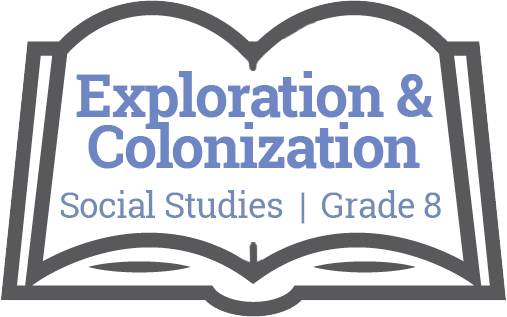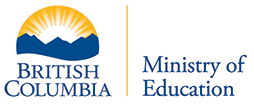
Unit Plan: Exploration & Colonization
Social Studies / Grade 8

Big Ideas
Exploration, expansion, and colonization had varying consequences for different peoples.
Concepts:
- Exploration
- Colonization
- First contact
Essential Questions
Students will keep considering…
- How do conflicting ideas affect progress?
- What makes one culture seem more appealing than another?
Evaluative Criteria
Teacher Evaluative Criteria:
Geography extension/ mapping skills: Students create (3D model, online, or draw) the island, including natural resources found on it, geographic location in relation to other landmarks, location of settlement, etc.
Rubric:
Differentiation:
Adaptations:
> Students present one part of the project (oral debate OR written report)
> Written report is submitted in alternative form (drawing or mind map)
Evaluation:
Develop rubrics to assess this project. Suggested evaluation branches: oral debate, policy proposal, realistic suggestions for compromise between two communities.
Extension:
Quiz evaluation: can be open book and based on big ideas/ essential questions (synthesis) rather than fact-based recall.
Paragraph writing:
Scaffold assessment with feedback on thesis statements, paragraph outlines, practice arguments.
Possibilities for paragraph expansion:
> Peer review paragraphs
> Create rubric with students; have students self-assess
Possibilities for project expansion:
> Study culture of indigenous groups around the world (e.g. music, food, religious traditions, etc.)
> Have students create map of the world during age of exploration to show specific information. E.g. natural resources, migration patterns, languages, etc.
Project evaluation:
Develop rubric to assess research skills (quality of sources, bibliography), presentation skills, information found (accuracy, relevancy).
Monitoring Progress
Teacher will monitor progress:
Teachers can monitor progress through ongoing formative assessment including but not limited to:
> Note-taking (extracting big idea from text)
> Primary source analysis
> Group discussions
> Optional assignments: journal entries, etc
Potential Student Misunderstandings:
N/A
Resources
WEBSITES
- Age of Exploration Handout
- Peoples of BC Map
- HBC Teaching resources
- National Humanities Centre
- Nova Scotia Digital Collections
- Newfoundand Heritage
PRIMARY SOURCES
BOOKS
- Pathways by Michael Cranny
- Crossroads: A Meeting of Nations by Michael Cranny
- Weslandia by Paul Fleischman
- Raven Steals the Light by Bill Reid
OTHER
Reflection
How will teachers and their students reflect on and evaluate the completed project?
Constant feedback from students and dialogue after each activity outlined in the Learning Events will help to direct and adapt what is explored in the next activity. Self, peer and teacher evaluation of the Performance Task and its alignment with the essential questions.
Teacher:
Next time I teach this unit I would…
Allow students to select the short stories that link to Identity.
Student:
My students needed:
Process:
Product:
Content:
Potential Student Misunderstanding:
Downloads
Stage 3 – Learning Plan
EXECUTE THE LEARNING PLAN
LEARNING EVENTS:
- These learning events/activities are suggested activities only.
- In some cases the plans are not fully completed lesson plans.
- The teacher may choose some lessons/activities to span over several lessons.
- Teachers may add, revise and adapt these lessons based on the needs of their students, their personal preferences for resources, and the use of a variety of instructional techniques.
Learning events are enriched for students when teachers consider the “WHERE TO” acronym and guiding organizer by Wiggins and McTighe.
The Learning Events should always be prefaced by focusing on the essential questions:
- How do conflicting ideas affect progress?
- What makes one culture seem more appealing than another?
Acquisition-Meaning-Transfer
Lesson 1 - Introdction
The Learning Events should always be prefaced by focusing on the essential questions:
- How do conflicting ideas affect progress?
- What makes one culture seem more appealing than another?
Introduction (Lesson 1)
1. Begin with entry question and define colonialism and exploration with students within historical and current context. Does colonialism exist today? In what form? How have colonialism and exploration shaped our world in the past? (M)
a. Possible formats: brainstorm as a group, personal reflection and share, group mindmap, etc.
2. Introduce students to unit goals and final projects. (M)
Lessons 2-8 - Europe in the Age of Exploration
The Learning Events should always be prefaced by focusing on the essential questions:
- How do conflicting ideas affect progress?
- What makes one culture seem more appealing than another?
Europe in the Age of Exploration (Lessons 2-8)
1. Students study colonizing nations in 14-16th century Europe: which nations in Europe funded exploration? What was their goal? How did they travel? What beliefs did they hold of the world? (A)
a. Use combination of class textbook, online sources, independent research on specific questions (e.g. which countries did France colonize? What resources did India provide Britain?)
b. Give quizzes for content knowledge (A)
2. Students analyze primary sources from age of exploration and analyze their signification for historical study. (e.g. paintings, journals) (M)
3. Students study historical maps of the world and compare information on different maps: spheres of political information, resources, languages, geographic information (M)
a. Consider information that can be included on different types of maps
b. compare maps as geographic tools and as historical documents
4. Give quiz or in-class assignment (evaluated) for primary source analysis competency (M)
5. Workshop thesis statements in class. (MT)
a. Review/ teach what makes a good thesis statement
b. Students develop learning questions about topics they have studied so far (e.g. what key differences in world views were most influential?)
c. Students draft thesis statements in response to these questions and self and peer evaluation in groups in class
Lessons 9-12 - Canada’s First Nations Pre-Contact
The Learning Events should always be prefaced by focusing on the essential questions:
- How do conflicting ideas affect progress?
- What makes one culture seem more appealing than another?
Canada’s First Nations Pre-Contact (Lessons 9-12)
1. Students study indigenous cultures across Canada pre-contact. (A)
a. Topics to consider: What resources were available to nations across the country? How did different nations use the land? How did language, cultural traditions and politics vary between nations?
b. Possible activities: project to compare cultural traditions across the country, case study on different nations across the country, source analysis of different nations, etc.
2. Students consider aspects of First Nations culture we see integrated into society today. Is this done in a meaningful way? How are First Nations traditions and cultures perceived today? (MT)
Lessons 13-16 - First Contacts
The Learning Events should always be prefaced by focusing on the essential questions:
- How do conflicting ideas affect progress?
- What makes one culture seem more appealing than another?
First Contacts (Lessons 13-16)
1. Students study first contact between French and English settlers and North American First Nations. (A)
a. Topics to consider: Cartier’s travels, Champlain and founding of Quebec, conflicts between French settlers and Iroquois nations, establishment of the fur trade (HBC and NWC), economic systems between fur traders and first nations, founding of Métis communities, migration of nations away from European colonies (e.g. Huronia and Quebec city)
2. Students consider how these interactions may have varied among different colonizing nations. Use mind map, group brainstorm, or carousel, etc. (M)
Lessons 17-21 - Research Project
The Learning Events should always be prefaced by focusing on the essential questions:
- How do conflicting ideas affect progress?
- What makes one culture seem more appealing than another?
Research Project (Lessons 17-21)
1. Introduce pairs research project on colonizing nations. (AM)
2. Students present research findings to class in gallery walk format (one student presents, one student tours other presentations, switch)
3. Have students compare and discuss peer presentations. (MT)
a. Questions to consider: What differences and similarities do we see in colonization? What were the goals of European nations? What is the role of former colonies today? How were interactions indigenous peoples and Europeans similar or different around the world? What influenced these differences?
4. Teach/ review historical paragraph structure (A)
5. Students write paragraph based on topics studied. MT
a. Possible topics: which European country was most successful at colonizing? What role did colonization play in establishing today’s world map? What makes colonization successful? Is colonization necessary for political advancement?
Lessons 21-25 - Colonization Project & Conclusion
The Learning Events should always be prefaced by focusing on the essential questions:
- How do conflicting ideas affect progress?
- What makes one culture seem more appealing than another?
Colonization Project & Conclusion (Lessons 21-25)
1. Introduce 21st Century colonization project (T) (see description above)
a. Students create and hand in written policy draft
b. In pairs, students debate in class (presentation of project), record their debate and submit oral recording to teacher for evaluation.
c. Students peer evaluate their partner’s arguments and provide feedback in class.
2. Conclude the unit with discussion and debrief. Questions to consider:
a. How did this experience change your understanding of what we have learned about European colonization?
b. What aspects of European colonization could have been changed to make it more fair?
c. How would the world look different today if a different process had taken place during European colonization?
d. What steps can we take today to reconcile failed colonization attempts?

The following resources are made available through the British Columbia Ministry of Education. For more information, please visit BC’s New Curriculum.
Big Ideas
The Big Ideas consist of generalizations and principles and the key concepts important in an area of learning. The Big Ideas represent what students will understand at the completion of the curriculum for their grade. They are intended to endure beyond a single grade and contribute to future understanding.
Core Competencies
 Communications Competency
Communications Competency
The set of abilities that students use to impart and exchange information, experiences and ideas, to explore the world around them, and to understand and effectively engage in the use of digital media
 Thinking Competency
Thinking Competency
The knowledge, skills and processes we associate with intellectual development
 Social Competency
Social Competency
The set of abilities that relate to students’ identity in the world, both as individuals and as members of their community and society
Curricular Competencies & Content
Curricular Competencies are the skills, strategies, and processes that students develop over time. They reflect the “Do” in the Know-Do-Understand model of curriculum. The Curricular Competencies are built on the thinking, communicating, and personal and social competencies relevant to disciplines that make up an area of learning.
Additional Resources
First People's Principles of Learning
To read more about First People’s Principles of Learning, please click here.
For classroom resources, please visit the First Nations Education Steering Committee.
